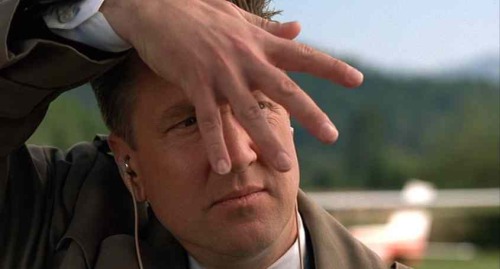Well look at that, barely one post in and we've already entered the darkness of the woods known to some as "
the Dweller on the Threshold," or more commonly, the Black Lodge surrounding the woods of Twin Peaks. If you are unaccustomed to the world of Twin Peaks, then I suggest you go to Netflix right now and watch it (or through whatever means you deem necessary) because it is worth it. But no, I will not waste your times with a discussion on the show in general but on the
prequel film released a year after the show was taken off the air. To some this film is a let down, and to
some it is one of director David Lynch's greatest works--let's not forget the
entire female population of Japan. There is also me, who falls somewhere in the middle off the two former sentiments. I viewed the film hoping to understand more of the series' many enigmas and, quite frankly, cosmic holes. What I ended up with was an hour of awesome build up for what I feel was a less than satisfactory ending, but I don't want to ruin or spoil anything for any prospective viewers, as they might love the ending, whilst despising the beginning.
Readers beware, the following MAY contain spoilers, though I try my best to avoid any.
 |
| Avert your eyes, David; this is getting serious. |
I suppose my main interest in discussing this film is to point out the way in which David Lynch built the film. It doesn't start right off as a dissection of the Laura's history, but rather as a surreal montage of the FBI's role in the murder of Theresa Banks. Now this was my favorite part, because aside from the abundance of cameos (here's looking at you, Bowie), it seems the most Lynchian of the film. I'm not saying that Mr. Lynch is a Barton Fink who can't even seem to write with that Barton-Fink-feeling, rather that the first half contains the most potential, or at least precognition, for the dream logic style that would dominate his later work.
To say that the murder of Theresa Banks was a "dream" that preceded the killing of everybody's favorite homecoming queen is an interesting one, as there is a connection between them that seems to be in the back of the FBI's mind; a blue rose case (I'm afraid I can't tell you about that one). Of course, that isn't likely, because how could such a sweet town like Twin Peaks be connected to something only of nightmares... right?
Well, that may not have said everything I had wanted to say (what was that again?), but I suppose I'll end with the fact that had Mr. Lynch stuck more with the style of the earlier portion of the film I would have been happier. Of course, you dear reader might always disagree, and if so, please tell me why. Until next time.

No comments:
Post a Comment